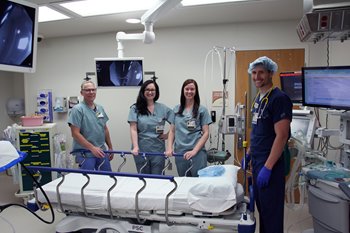Growth and Innovation: Pediatric Gastroenterology, Hepatology and Nutrition is expanding and adding new ways to serve patients
 The Pediatric Gastroenterology, Hepatology and Nutrition Division is already the busiest pediatric subspecialty service, and aims to be even more so – by becoming the only full-service Digestive Disease Center in the state outside of the New York City area.
The Pediatric Gastroenterology, Hepatology and Nutrition Division is already the busiest pediatric subspecialty service, and aims to be even more so – by becoming the only full-service Digestive Disease Center in the state outside of the New York City area.
The division, led by Lawrence J. Saubermann, M.D., cares for diseases involving the large and small intestines, esophagus, stomach, pancreas, liver and gall bladder. Its physicians, advanced practice providers, social workers, psychologists, and dieticians help children with a wide variety of conditions, including inflammatory bowel disorders, celiac disease, liver diseases, reflux, abdominal pain, constipation, irritable bowel disease, chronic nausea and vomiting, and eating disorders. The department has expanded rapidly in the past five years, growing from three physicians to eight, moving into a new outpatient clinic at Clinton Crossings, and opening a brand new endoscopy suite in the Golisano Children’s Hospital.
Many patients are treated here in Rochester, but the most complex conditions sometimes require trips to specialty clinics at large pediatric referral centers on the east coast or in the Midwest. For the past several years, the division has been adding specialty services to provide advanced care closer to home.
“A multidisciplinary approach toward complex diseases is necessary these days in order to provide optimal care to sick children,” says Saubermann, and the division has forged a number of new relationships and clinics to meet these needs. For instance, Esther Prince, M.D., is working with Pediatric Allergy, Pulmonary, and ENT divisions as part of an Aerodigestive Center. This center is treating conditions that involve the upper respiratory and GI tract, like the allergic condition known as eosinophilic esophagitis, or recurrent aspirations/pneumonias due to developmental defects.
 Also, through their Pediatric Advanced Nutrition Service (PANS), the division is working closely with the GCH Pediatric Surgeons and Radiologists to assist in managing the neediest of patients’ nutrition requirements. Children who are born premature, or have major disease complications, like short gut syndrome, may require specialized nutrition support for a time or even permanently. This often includes insertion and removal of feeding tubes placed in infants, and managing nutrition in children who sometimes require feeding in their veins to stay alive. These forms of feeding require very close monitoring of their labs, since all their caloric and vitamin requirements have to be met in order for them to grow properly.
Also, through their Pediatric Advanced Nutrition Service (PANS), the division is working closely with the GCH Pediatric Surgeons and Radiologists to assist in managing the neediest of patients’ nutrition requirements. Children who are born premature, or have major disease complications, like short gut syndrome, may require specialized nutrition support for a time or even permanently. This often includes insertion and removal of feeding tubes placed in infants, and managing nutrition in children who sometimes require feeding in their veins to stay alive. These forms of feeding require very close monitoring of their labs, since all their caloric and vitamin requirements have to be met in order for them to grow properly.
The recent addition of a specialist in pediatric liver transplants, Nanda Kerkar, M.D., filled an important spot in the portfolio of the services the division can offer. Golisano Children’s Hospital is now the only liver transplant group in upstate and western New York state, and the only pediatric-specialty group in liver transplant outside of New York City; the group expects to perform its first transplant this summer.
In the coming year, the division is working to put another crucial piece in place: A specialist to care for complex disorders related to pediatric gastrointestinal (GI) motility. When nerves or muscles in any portion of the digestive tract do not function with their normal strength and coordination, a person develops symptoms related to these motility problems. The condition can affect both children and adults. For example, if the esophagus is not functioning properly, people may have difficulty swallowing, or if the large intestine isn’t working, they may have severe constipation.
Only a few centers in the country provide advanced diagnostic and treatment options for pediatric motility; specialists in this discipline are rare, with only a small number of training centers in the United States. Establishing a specialty service in motility is the next step in meeting the division’s vision to become the one-stop destination for pediatric gastrointestinal patients in New York, and the northeast region.
As the division expands its focus on specialized services, it also plans to adopt new treatment approaches to deal with complex conditions. For instance, a more personalized medicine approach, using genetic testing, appears to be on the horizon for treating patients with inflammatory bowel disease (IBD). This approach has been used to good effect in treating cancer patients, Saubermann notes, and could help their patients as well. The division is already participating in clinical trials of upcoming immune therapies for IBD, and as the division grows, there will be more opportunities for research in IBD and other GI areas.
Many of the GI issues can be very stressful for patients and their families, and the reverse is also true: stressful situations can trigger many GI symptoms. The team’s psychologists, dieticians, and social workers all work together to provide care, guidance and support to help patients manage their symptoms emotionally as well as physically.
“It’s a very exciting time to be in the field of pediatric gastroenterology,” Saubermann says. “We have new therapies for inflammatory bowel and liver diseases, and much better options for diagnostic testing and imaging in children. By working together with other specialists, we are able to provide an all-encompassing GI ‘home’ for sick kids in our developing Digestive Disease Center at Golisano Children’s Hospital.”

